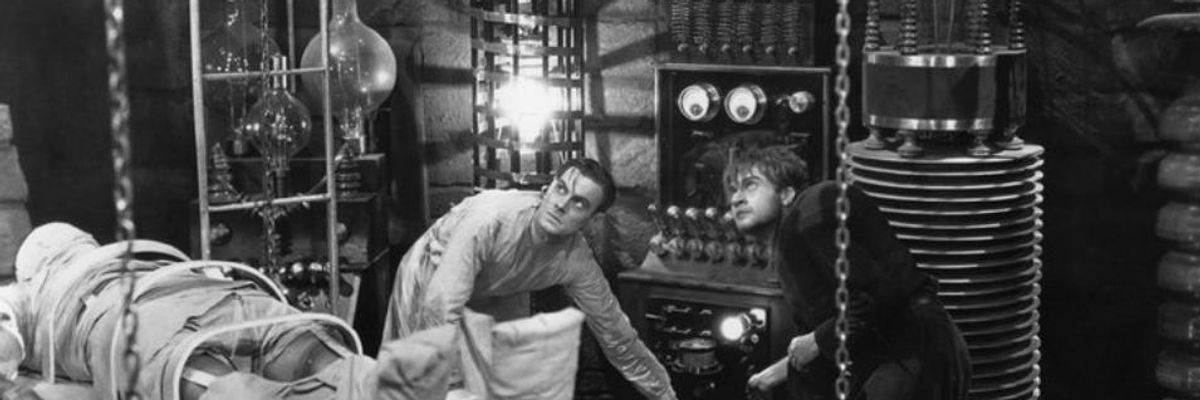

SUBSCRIBE TO OUR FREE NEWSLETTER
Daily news & progressive opinion—funded by the people, not the corporations—delivered straight to your inbox.
5
#000000
#FFFFFF
To donate by check, phone, or other method, see our More Ways to Give page.


Daily news & progressive opinion—funded by the people, not the corporations—delivered straight to your inbox.

The American Energy Solutions for Lower Costs and More American Jobs Act is a Frankenstein's monster of bad energy policy. (Photo: Fr. Dougal McGuire/Creative Commons)
In preparation for Election Day--or maybe Halloween?--the House leadership has assembled a Frankenstein's monster of bad energy policy. Pieced together from the remains of 13 separate bills already passed by the House, but justifiably ignored in the Senate, these zombies are being raised from the dead for one final piece of political theatre before the election.
In preparation for Election Day--or maybe Halloween?--the House leadership has assembled a Frankenstein's monster of bad energy policy. Pieced together from the remains of 13 separate bills already passed by the House, but justifiably ignored in the Senate, these zombies are being raised from the dead for one final piece of political theatre before the election.
As Lindsay Abrams at Salon points out, the choice to revive a bundle of hyper-partisan bills just weeks before an election amounts to legislative trolling on an epic scale. For Americans who don't take kindly to Congressional trolling and who oppose climate disruption, unregulated drilling and an extra layer of coal dust in their lungs, Friends of the Earth offers a guide to these walking dead policy measures.
Here are the five worst things the Frankenstein act, officially called the American Energy Solutions for Lower Costs and More American Jobs Act, would do:
Trump and Musk are on an unconstitutional rampage, aiming for virtually every corner of the federal government. These two right-wing billionaires are targeting nurses, scientists, teachers, daycare providers, judges, veterans, air traffic controllers, and nuclear safety inspectors. No one is safe. The food stamps program, Social Security, Medicare, and Medicaid are next. It’s an unprecedented disaster and a five-alarm fire, but there will be a reckoning. The people did not vote for this. The American people do not want this dystopian hellscape that hides behind claims of “efficiency.” Still, in reality, it is all a giveaway to corporate interests and the libertarian dreams of far-right oligarchs like Musk. Common Dreams is playing a vital role by reporting day and night on this orgy of corruption and greed, as well as what everyday people can do to organize and fight back. As a people-powered nonprofit news outlet, we cover issues the corporate media never will, but we can only continue with our readers’ support. |
In preparation for Election Day--or maybe Halloween?--the House leadership has assembled a Frankenstein's monster of bad energy policy. Pieced together from the remains of 13 separate bills already passed by the House, but justifiably ignored in the Senate, these zombies are being raised from the dead for one final piece of political theatre before the election.
As Lindsay Abrams at Salon points out, the choice to revive a bundle of hyper-partisan bills just weeks before an election amounts to legislative trolling on an epic scale. For Americans who don't take kindly to Congressional trolling and who oppose climate disruption, unregulated drilling and an extra layer of coal dust in their lungs, Friends of the Earth offers a guide to these walking dead policy measures.
Here are the five worst things the Frankenstein act, officially called the American Energy Solutions for Lower Costs and More American Jobs Act, would do:
In preparation for Election Day--or maybe Halloween?--the House leadership has assembled a Frankenstein's monster of bad energy policy. Pieced together from the remains of 13 separate bills already passed by the House, but justifiably ignored in the Senate, these zombies are being raised from the dead for one final piece of political theatre before the election.
As Lindsay Abrams at Salon points out, the choice to revive a bundle of hyper-partisan bills just weeks before an election amounts to legislative trolling on an epic scale. For Americans who don't take kindly to Congressional trolling and who oppose climate disruption, unregulated drilling and an extra layer of coal dust in their lungs, Friends of the Earth offers a guide to these walking dead policy measures.
Here are the five worst things the Frankenstein act, officially called the American Energy Solutions for Lower Costs and More American Jobs Act, would do: